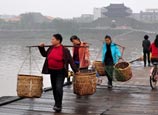
LIFE in the country was anything but bucolic for millions of educated Chinese youth "sent down" to the countryside to learn from farmers in the late 1960s. The period remains controversial, inspiring a TV series and website. Cui Yuanlei and Li Huaiyan report.
Fifty-nine-year-old Xie Ying says her life would be totally different, and possibly not as satisfying, if she had not experienced her years as zhi qing (?a?à).
Zhi qing, or educated youth, were the students from cites who spent the prime of their life toiling in the countryside during Chairman Mao Zedong's re-education campaign.
Xie, a native of Chengdu in Sichuan Province, says her time spent with farmers taught her to be tolerant and grateful.
"I find I'm stronger and more tolerant thanks to my experience in the countryside," says Xie, who works in the Yunnan Provincial People's Congress in southwest China.
In 1971, Xie took a train from Chengdu, capital of Sichuan, to Kunming, capital of Yunnan, in the far south.
The 17-year-old girl then spent another five days traveling from Kunming to a farm in Ruili, a (Myanmar) border city largely inhabited by the ethnic Dai and Jingpo people.
Xie's first task was to learn how to log. Educated youth were sent up a mountain with farmers in the morning to collect wood, which they would take back with them before sunset, Xie says.
"It was quite a hard time," Xie recalls. "We - who did not have to worry about what to eat and wear at home in the city and didn't even wash our own bowls after meals - had to do everything all by ourselves in addition to the farming work."
In the 1960s, millions of young people in cities and towns went "up to mountains and down to villages" at the call of Chairman Mao to receive re-education from farmers and help with rural development. Mao believed that the countryside offered vast room for young people to bring their talents and skills into full play. He also believed bourgeois urban young people, many from intellectuals' families, were too soft and needed to do manual labor and learn from farmers.
Many zhi qing had bitter experiences and lost valuable education and career opportunities. They never caught up; they were a lost generation. Others made the best of it, some were stronger for it and went on achieve success in various fields.
Most sent-down young people returned to their urban homes around the end of the "cultural revolution" (1966-1976). Mao's campaign was depicted in the literature of the 1980s, filled with stories about the youth's hard and bitter experiences.
This literary genre reflected complaints and resentment, according to Yang Jianlong, a professor at Shanghai Normal University who himself was a sent-down youth.
The sentiments of this "forgotten generation" simmered during the 1990s, when they found themselves disadvantaged. At that time China's market-oriented reforms posed employment challenges for them since they were older and many of them unskilled.
Down-to-earth manner
The trend, however, has been changing both in the literary sphere and in reality in recent years, as more educated youth are reflecting on their experiences in the countryside in a philosophical way.
Feng Jiankun, a retired official in Kunming, says he got to know a different side of his country when he was sent down to the city of Simao in Yunnan.
"No matter who you are, you have to work for the people in a down-to-earth manner. This is what I learned in the countryside," says Feng, who spent 10 years in the countryside of Simao, initially working as a herder and then a farmer.
"I learned that we cannot do things just out of passion. We have to take a practical attitude and start from reality," he says.
As some observers have pointed out, however, there was indeed a division between the educated, sent-down youth and other people in their later development.
While the group does not lack success stories, with some people taking national leadership posts, many are still troubled by their employment and living conditions, according to Li Zhenlin, a professor at the Shanghai Theater Academy.
The division can partly explain the controversy about the history of educated youth, as demonstrated by discussions regarding a TV series, "Educated Youth," that premiered on China Central Television in May 2012. The 45-episode series about youth in far northeastern Heilongjiang Province is now being shown in Heilongjiang, the Inner Mongolia Autonomous Region and other places.
It stirred a huge uproar about what some called painful history. While some critics say the TV show incorrectly downplayed the sent-down youth's suffering, others argue that it offers insight into contemporary Chinese history.
TV show
In the words of freelance news commentator Guo Songmin, the TV series reflects the sent-down youth's perseverance in pursuing their ideals and their zeal in responding to the call of the times.
Ma Yunchang, who was sent to Inner Mongolia for five years, now manages a website (www.chinazhiqing.org) aimed at zhi qing. He says he's a fan of the TV show.
"History is stereoscopic and artistic works just reflect part of it," says Ma. "Different people from different backgrounds may certainly have different views about that period of history."
Ma says he never argues with others about whether the time in the countryside was wasted or whether he regrets it.
"The social environment required young people to go to rural areas. Our generation was educated to put the nation's interests above our personal needs," Ma says.
Ma's website is a platform that allows sent-down youth to post essays and information regarding their experiences and to track down old friends with whom they have lost contact. The website also collects donations for sent-down youth who have difficulty paying medical bills today because they were never able to earn a good living.
For 59-year-old Xie, the TV series offered a chance to look back on her past. "Some of the stories in it are so familiar. They're very much like my own experience," she says.
Xie says the days spent in the countryside offered educated youth a chance to feel people's pain and needs.
"Our bond with the grassroots can never be severed," Xie says, "no matter where we are or what we do."
















 Sea burial held in China's Tianjin before Qingming
Sea burial held in China's Tianjin before Qingming


![]()
